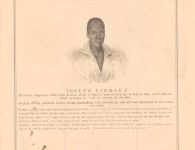Photo credits: Library of Congress
While the majority of the nation ratified the Thirteenth Amendment to end slavery, states such as Delaware, Kentucky, and the Territory of Oklahoma declined to do so. Delaware’s General Assembly refused to adopt the Thirteenth Amendment, claiming that it was an unconstitutional expansion of federal authority over the state.
Delaware had previously rejected numerous earlier attempts to end slavery, such as Lincoln’s 1861 pledge to reward Delaware’s slave owners with federal monies — in exchange for the freedom of their Black slaves. The Delaware assembly responded to Lincoln’s plan with a proclamation declaring:
“When the people of Delaware desire to abolish slavery within her borders, they will do so in their own way, having due regard to strict equity.”
For many years, the Delaware legislature repeatedly voted against the Thirteenth Amendment’s first ratification. However, it also voted against the Fourteenth and Fifteenth Amendments of 1868 and 1870, which expanded civil rights and voting liberties to Black people, as well as those who were previously slaves. Finally, Delaware approved the Thirteenth Amendment, which ended slavery on February 12, 1901.
This was 36 years after the rest of the nation had already done so.




















No comments